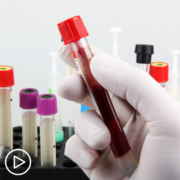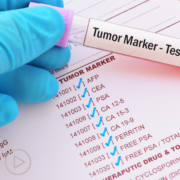How Do Biomarker Test Results Impact Gastric Cancer Treatment Options?
How Do Biomarker Test Results Impact Gastric Cancer Treatment Options? from Patient Empowerment Network on Vimeo.
Biomarker test results comprise one of several factors that impact gastric cancer treatment options. Dr. Yelena Janjigian explains biomarker testing, key gastric cancer biomarkers that affect care, and other factors that may impact treatment decisions.
Dr. Yelena Janjigian is Chief of Gastrointestinal Oncology Service at Memorial Sloan Kettering Cancer Center.
See More From INSIST! Gastric Cancer
Related Programs:

|

|

|
Transcript:
Katherine:
Dr. Janjigian, I’d like to talk about what goes into deciding on a best treatment for a patient. Is there testing that helps you understand a patient’s individual disease?
Dr. Janjigian:
One is an important factor about this disease, and when the patient comes in, the number one factor that helps us decide, what treatment to assign, is how well is the patient feeling? What are their nutritional deficits? How functional they are. Are they able to tolerate the treatment?
Because as an oncologist, the first rule is do no harm. Most patients come in when they’re first diagnosed are pretty well functional. They’re still able to eat. And so, they’re really up for the most aggressive. And that’s probably the number one wish I have from patients. I just want us to stay well and stay alive. So, we can be very aggressive with them, at least folks that come to see us in New York. And so, then the decision fork is really do you want only standard therapy, or are you interested in clinical trials? And I think what I am able to really explain to the patients, which is great, is that the benefit of trials – and, of course, you can never guarantee that a trial will be successful, right? Because that’s by definition – a clinical trial is experimental therapy.
But for gastric cancer and stomach cancer where we need as many treatment options as possible, a clinical trial gives you an opportunity to try something different, and then go back to standard therapy, and then try experimental therapy, and then go back to standard therapy.
So, it gives you as many options as possible. The way that I help our patients visualize this is you’re trying to cross a very wide and somewhat turbulent river. And you need as many stepping stones as possible. And a clinical trial, if it makes sense for you and if you’re able to do it physically, it gives you that other option. The most important other factor is to understand which subset of stomach cancer you have, right? Because biomarker testing has helped us tremendously to advance this disease. If you look at and if you watch any of my talks, I usually have this timeline of therapeutic development in stomach cancer until really this past year.
We’re 2022, 2021. There was over a decade of negative trials, right? And the reason why I think is because the design of the trial really focused on targeting all the patients the same way. And now the trials are becoming more and more sophisticated. So, when we talk about the biomarker testing of the tumor, the patient’s specific tumor.
It’s important for the patient to ask their physician. “What is the status of my tumor?” And the four critical biomarkers are microsatellite instability, HER2, PD-L1, and Claudin-18.2. So, those four biomarkers have really helped us transform this field especially in patients with metastatic disease. And in all of the tertiary cancer centers, certainly here at Memorial Sloan Kettering, for each of the subsets we have a full research portfolio.
So the patients have both standard and experimental options available to them.
Katherine:
Well, how can test results like biomarker testing affect the patient’s prognosis and treatment options?
Dr. Janjigian:
It will depend on the treatment and how it is paired to the biomarkers. So, for example, a certain subset of tumors such as microsatellite and stable tumors are patients with PD-L1 high tumors or even patients with HER2-positive tumors. Now in clinical trials, we see that those patients have an outstanding dramatic response to combination therapies often with chemotherapy or immunotherapy together or even HER2 directed therapy with immunity therapy. So, it really will impact how likely your tumor is to shrink. And if the tumor is shrinking, and if you’re feeling better, obviously that translates to better survival.
Katherine:
Yeah. What questions should patients be asking about their test results?
Dr. Janjigian:
I think it’s important for patients to be very clear with their providers about their willingness to undergo repeated biopsies if needed.
I think the number one misunderstanding or misnomer that I see when patients come in to see me as a highly trained specialists, and they’re seeking me out for expertise and second and third and fourth opinions is that when the biomarker test is not done, often the answer in the community from the physician was, “Well, there was insufficient tissue or the tissue quality was not great, and that’s we’re going to do it.
And it turns out the patient is perfectly willing and able to undergo a second biopsy. They really do not mind because a lot of times it’s just as simple as having a repeat endoscopy. Or even on treatment off and the problem is it’s a constantly evolving cancer. So, for example, if you receive first-line treatment and then you progressed and you need additional treatment, often it’s important to get a second biopsy to understand what your biomarkers are at that point.
And I described this to my patients. We can’t get into a battle with outdated maps. We need to know. And sometimes when there’s a misunderstanding, the doctors think, “Maybe the patient wouldn’t be willing to do it. Or they are risk-averse.” And the patient’s more than willing to do it. So, I think communicating your wishes and your intent clearly with your doctors and not being shy to ask questions, and also not being shy to seek out clinical trials, right?
So, yesterday I was in clinic. I see a lot of this disease. I often see 30 patients at clinic. I had an 80-year-old patient in my clinic, right? And before you meet the patient, most doctors would think, “Well, it’s an elderly patient. They wouldn’t even be interested in clinical trials. What are we trying to accomplish here?”
Katherine:
Right.
Dr. Janjigian:
But this patient clearly is – he exercises five days a week. He’s extremely active. He wants the best options for him.
So, I am not an ageist, so I asked him. I said, “What are your sort of goals of this therapy? And how interested are you in clinical trials?” And him and the family were extremely enthusiastic. And, “We’re going to go for it, and we’re going to try.” So, I think having those conversations with your doctors – because you remember gastric cancer is very rare.
In my clinic I see 30 patients, but in most normal sort of oncology practices, it’s lung, breast, and colon, the big three that sort of saturate the schedule of the oncologists. So, if they see one or two gastric cancers a month, they may not be thinking along the same lines of your disease. So, then you have to ask the questions of, “Are there any clinical trials? Should I see a specialist?” Did you do all of my biomarkers?















